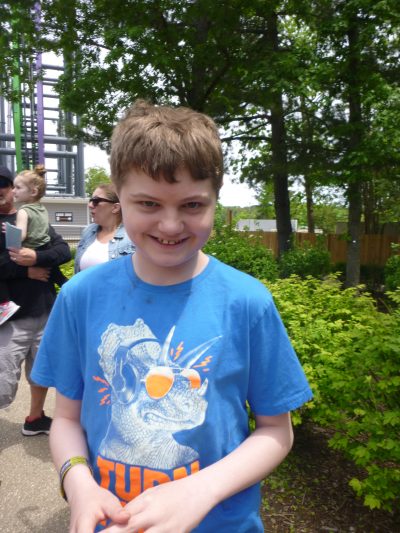
I want you to know that I see you. You’re the mom sitting with your daughter as she does yet one more task for her Early Intervention provider who is gushing over her accomplishments. You’re the dad sitting in on the IEP meeting hearing about all the progress your son is making, listening gratefully to how proud they are of all the goals your son has attained. You’re the parent whose child is young, so very young to carry those letters around, and things are so much better since she started therapy or he entered school. Your child is often happy and engaged. After months of evaluations and long waits for doctor’s visits, you can finally breathe.
But that voice inside that’s been a constant companion for months tells you that your daughter is doing great, but will stay on the severe end of the spectrum. The voice is telling you that despite potty training and those few precious syllables, your son will need lifetime care. It’s the voice that despite all the lovely Early Intervention reports and school progress reports, refuses to go away.
That voice was my constant companion a decade ago, and for my eldest son, it was right.
|
|
I have two boys on the spectrum. My eldest is fourteen and on the severe end of the spectrum, and my youngest at ten is only mildly affected. I became pregnant with my youngest when my eldest son was three, and watched my typically developing toddler lose all his words and the light in his eyes when he was eighteen months old. In the space of two months he lost a year’s worth of milestones in all domains. I later watched in wonder as he entered therapy and regained his words, once again mastered those milestones, and recovered his spark. It didn’t happen overnight. There were no miracle drugs, no unproven therapeutic interventions. The truth is he got less attention than his big brother had when I was doing thirty hours a week of ABA with him myself in Virginia because Early Intervention options in the Old Dominion in 2004 sucked. My youngest simply improved monthly, weekly, daily, to the point that he’s now in double digits, and we just rescinded his 504.
And somewhere, maybe a year into his amazing improvements, I knew my eldest’s severe symptoms were here to stay.
There wasn’t one lightbulb “Aha!” moment when I knew Justin would need lifetime care. The realization just slowly came over me, particularly as I watched my youngest defy many people’s expectations (some of his doctors were completely doom and gloom, we ditched them) and once again return to the ebullient boy we had known. Justin certainly made progress, but communication was minimal even after having tried a variety of devices, words were nonexistent, and his meltdowns and sleep issues and eating constraints were slow to dissipate.
At some point I just knew his progress would never reflect his little brother’s. And I will tell you the truth; it was a realization I mourned.
I am a “suck it up” kind of gal, but I will tell you there was a period of time where I was simply distraught. It’s either a blessing or a curse that I’m a big picture person, and I was unable to envision a version of adult life for Justin that did not encompass any of the things I thought he’d need to be content- college, friends, a career, independence. I truly grieved the loss of those events for him, honestly felt he could not lead a joyful, fulfilled life without them.
Ten years later and after a lot of soul-searching as to what truly makes my son happy, I no longer feel this way.
My fourteen-year-old son with limited communication skills, intellectual disability, and accompanying OCD, is happy. When I say happy, I mean that when not immersed in the throes of OCD he is affectionate, engaged with his chosen few, and exuberant. He loves his school. He loves his house. He loves salted pretzels (who doesn’t?). He loves his life, without the promise of the neurotypical path his parents took. He is, in his own way with his DVDs and Baby Einstein clips on YouTube, fulfilled.
I realized that all those expectations I had, those requirements for a happy life, were mine, and mine alone.
I want to be clear that this realization that my son didn’t need my life plan to love his life comes coupled with the knowledge that I will most likely not be here to protect him for his entire lifespan. Honestly, it is a constant source of distress for me. I often envision living to one hundred sixteen to his eighty and going out in one great sigh together, but I know that won’t happen (although if I could will it, I would). Over time I’ve learned to compartmentalize this sadness, but not deny it. It’s just that I want to be here, present, to enjoy my sons’ collective progress, their indomitable spirits, their joy in their unique lives.
There is so much good here. I don’t want to miss a minute.
So I see your smile, the one you’ve plastered on because it’s the appropriate thing to do even as your heart hurts from the weight of a future you just don’t know yet. I see you. I won’t promise it will all work out okay, because no one, not even the most brilliant professional, can do that for you.
However, I will say this. Mourn when you need to. Talk about your fears to people who live what you’re going through. Get it all out, and take care of yourself while you do.
And remember this; even in the altered landscape of your lives, leave yourself open to hope, and to the possibility of happiness.
For more on my family visit my blog at autismmommytherapist.wordpress.com
Follow me on Facebook at Autism Mommy-Therapist











